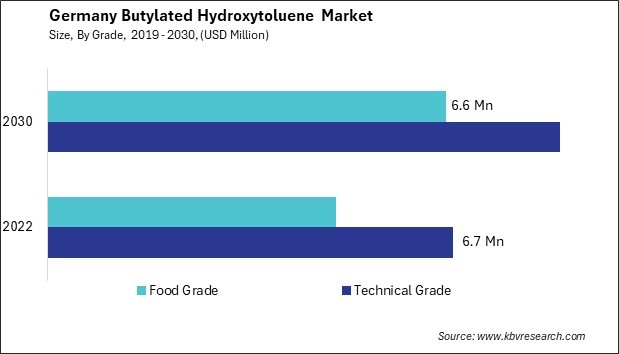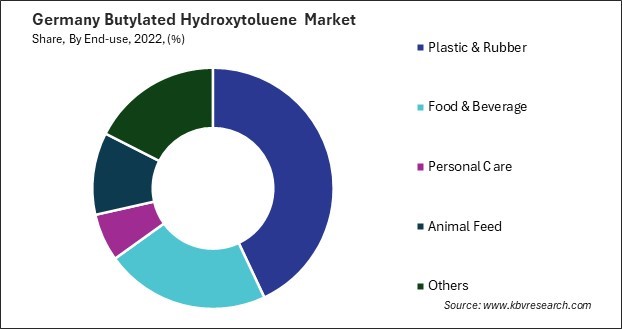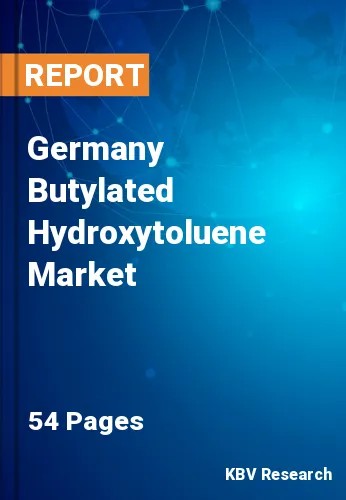The Germany Butylated Hydroxytoluene Market size is expected to reach $15.2 Million by 2030, rising at a market growth of 3.5% CAGR during the forecast period. In the year 2022, the market attained a volume of 2202.2 Tonnes, experiencing a growth of 3.5 % (2019-2022).
The rising demand for butylated hydroxytoluene (BHT) in Germany can be attributed to several key factors. The country's strong industrial base, particularly in the automotive, chemical, and manufacturing sectors, has led to a growing need for antioxidants like BHT to protect products from oxidation and degradation. As these industries continue innovating and expanding, the demand for BHT as a stabilizing agent will rise. Additionally, the increasing focus on food safety and quality in Germany has led to greater use of BHT as a preservative in food and beverage products. With consumers demanding products with longer shelf life and higher quality standards, manufacturers are turning to BHT to meet these expectations and ensure the integrity of their offerings.

According to the Germany Trade & Invest, Germany's food and beverage industry is the fourth-largest industry sector in Germany – generating a production value of EUR 185.3 billion in 2020. The largest industry segments by production value are meat and sausage products (24.3 percent), dairy products (15.5 percent), baked goods (9.4 percent), and confectionery (7.8 percent). The largest industry segments by production value, including meat and sausage products, dairy products, baked goods, and confectionery, are all areas where BHT could be used as a preservative. These products often require protection against oxidation and degradation to maintain their quality and freshness, making BHT a potentially essential ingredient in these segments.
Furthermore, the growing awareness of environmental sustainability has led to developing eco-friendly formulations that require effective antioxidants like BHT to maintain product stability without compromising environmental impact. This trend has contributed to the rising demand for BHT as industries seek sustainable solutions for their products. Moreover, the COVID-19 pandemic prompted regulatory changes and heightened scrutiny of hygiene and safety standards in various industries. This has increased attention to using preservatives like BHT to ensure product safety and compliance with evolving regulations.
A key driver of the expanding demand for animal feed in Germany is the country's strong livestock industry. With a large and diverse livestock sector that includes dairy, poultry, swine, and cattle production, there is a consistent need for high-quality animal feed to sustain these animals and ensure their optimal growth and health. As the demand for meat, dairy, and other animal products continues to rise, so does the need for feed to support the growing livestock population.
Furthermore, Germany's position as a major exporter of meat and dairy products within the EU and globally has contributed to the increased demand for animal feed. The country's reputation for high-quality agricultural products has led to a rise in exports, which in turn requires a steady and reliable supply of nutritious animal feed to maintain the health and productivity of livestock destined for export markets.
According to the Germany Trade & Invest, in 2020, livestock industry reached a production value of more than EUR 45 billion. The major segments in terms of volume include pork (60.4 percent), chicken (18.6 percent), and beef (13.1 percent) in 2019. Additionally, organic meat is becoming increasingly popular. The volume of organic poultry sales rose by about 70 percent in 2020, with red meat (beef, pork, goat, lamb) share rising by 51 percent. The rising popularity of organic meat production, as indicated by the significant increase in organic poultry and red meat sales volume, can also drive the demand for BHT.
Organic meat production often requires preservatives approved for organic use and comply with strict organic standards. As an approved antioxidant, BHT may be sought after by organic meat producers looking for effective preservatives that meet organic certification requirements. Thus, the expanding meat industry in Germany and the increasing demand for high-quality and organic meat products may drive market growth and innovation in the production and use of BHT.
Germany has been experiencing a growing demand for technical grade BHT driven by various factors that reflect this antioxidant's increasing industrial and commercial applications. Technical grade BHT is used in a wide range of industries, including plastics, rubber, fuels, lubricants, and coatings, where it serves as a stabilizer and antioxidant to prevent degradation and extend the lifespan of products.
The country's strong industrial base is one significant driver of the growing demand for technical grade BHT in Germany. Germany is known for its advanced manufacturing capabilities, particularly in the automotive, chemical, and machinery sectors. These industries rely on technical grade BHT to enhance the stability and durability of their products, especially in applications where exposure to heat, oxygen, or other environmental factors can lead to degradation.
The automotive industry, in particular, is a major consumer of technical grade BHT in Germany. BHT is used as an antioxidant in automotive fluids, such as engine oils and transmission fluids, to prevent oxidation and maintain the performance of critical components. With Germany being a leading global producer of automobiles and automotive components, the demand for technical grade BHT is closely tied to the growth and innovation in this industry.
The growing emphasis on sustainability and environmental regulations has also contributed to the demand for technical grade BHT in Germany. As industries seek to develop more environmentally friendly products and processes, the use of antioxidants like BHT becomes essential in prolonging the lifespan of materials and reducing waste. Thus, all the aforementioned factors will aid in the market growth in Germany.

Several companies are active in the German butylated hydroxytoluene market, playing crucial roles in supplying this antioxidant to meet the demands of various industries. These companies are involved in BHT's production, distribution, and marketing, catering to diverse sectors such as food and beverage, cosmetics, pharmaceuticals, plastics, rubber, and more.
One prominent player in the German butylated hydroxytoluene market is LANXESS AG, a leading specialty chemicals company known for its high-quality products and innovative solutions. LANXESS produces and supplies BHT for a wide range of industrial applications, leveraging its expertise in chemical manufacturing to meet industry demands. BASF SE, a global chemical company, is another significant contributor to the German butylated hydroxytoluene market. BASF manufactures and supplies BHT for industrial use, offering a diverse portfolio of chemicals that cater to various applications across industries.
Eastman Chemical Company is recognized for its production and supply of BHT under the brand name Tenox. The company's products are widely used in the food, beverage, and pharmaceutical industries, making it an important player in the German butylated hydroxytoluene market. Sasol Limited is an international integrated chemicals and energy company that produces a variety of chemicals, including BHT, for industrial applications. The company's commitment to innovation and sustainability has positioned it as a significant supplier of BHT in the German market.
OXEA GmbH is a global manufacturer of oxo intermediates and derivatives, including BHT, used in various applications such as lubricants, plastics, and coatings. OXEA's products cater to various industries, contributing to its presence in the German butylated hydroxytoluene market. These companies and others in the market form a robust ecosystem that supplies butylated hydroxytoluene to meet the demands of diverse industries in Germany. Their products and services contribute to stability, quality, and innovation across various industrial applications.
By Grade
By End-use
Our team of dedicated experts can provide you with attractive expansion opportunities for your business.

